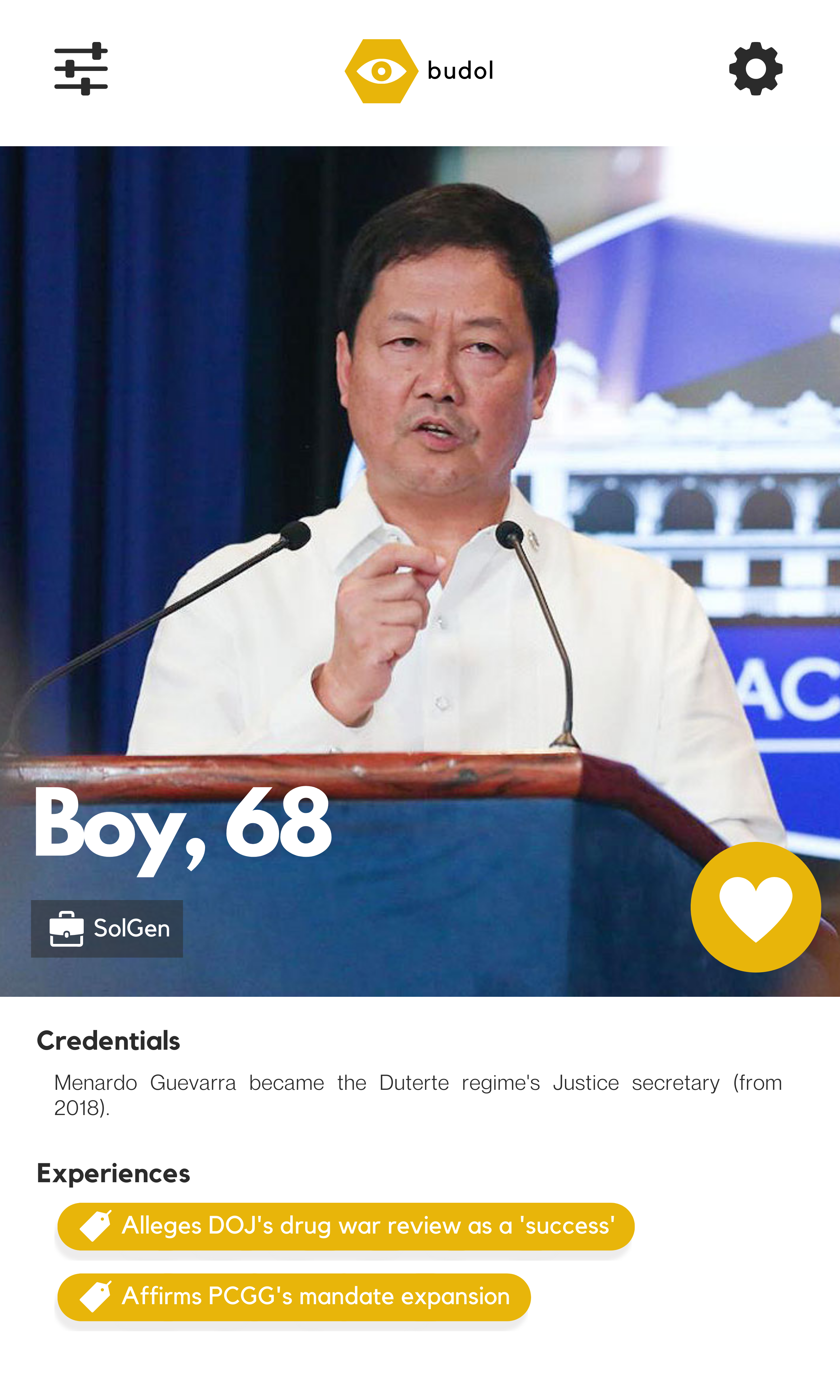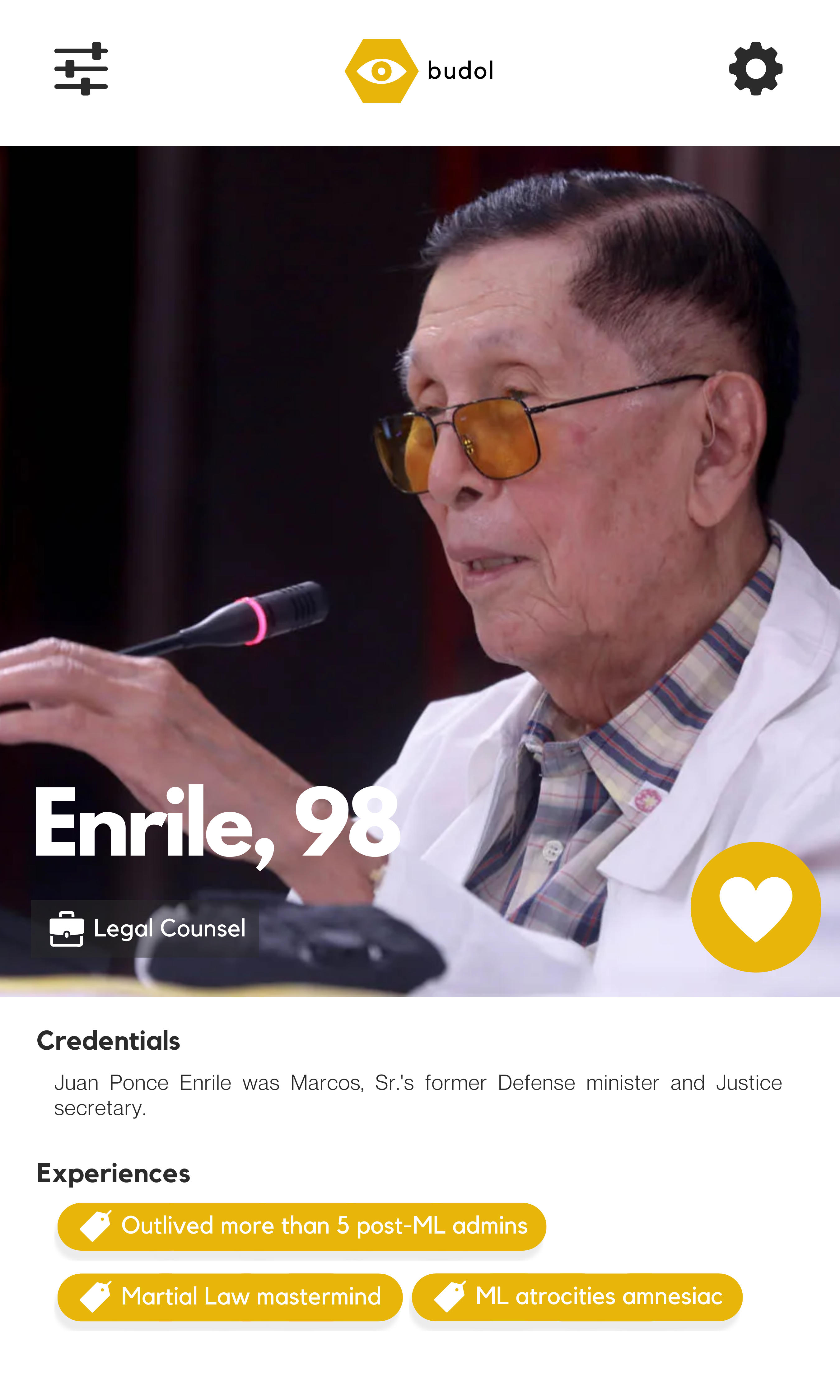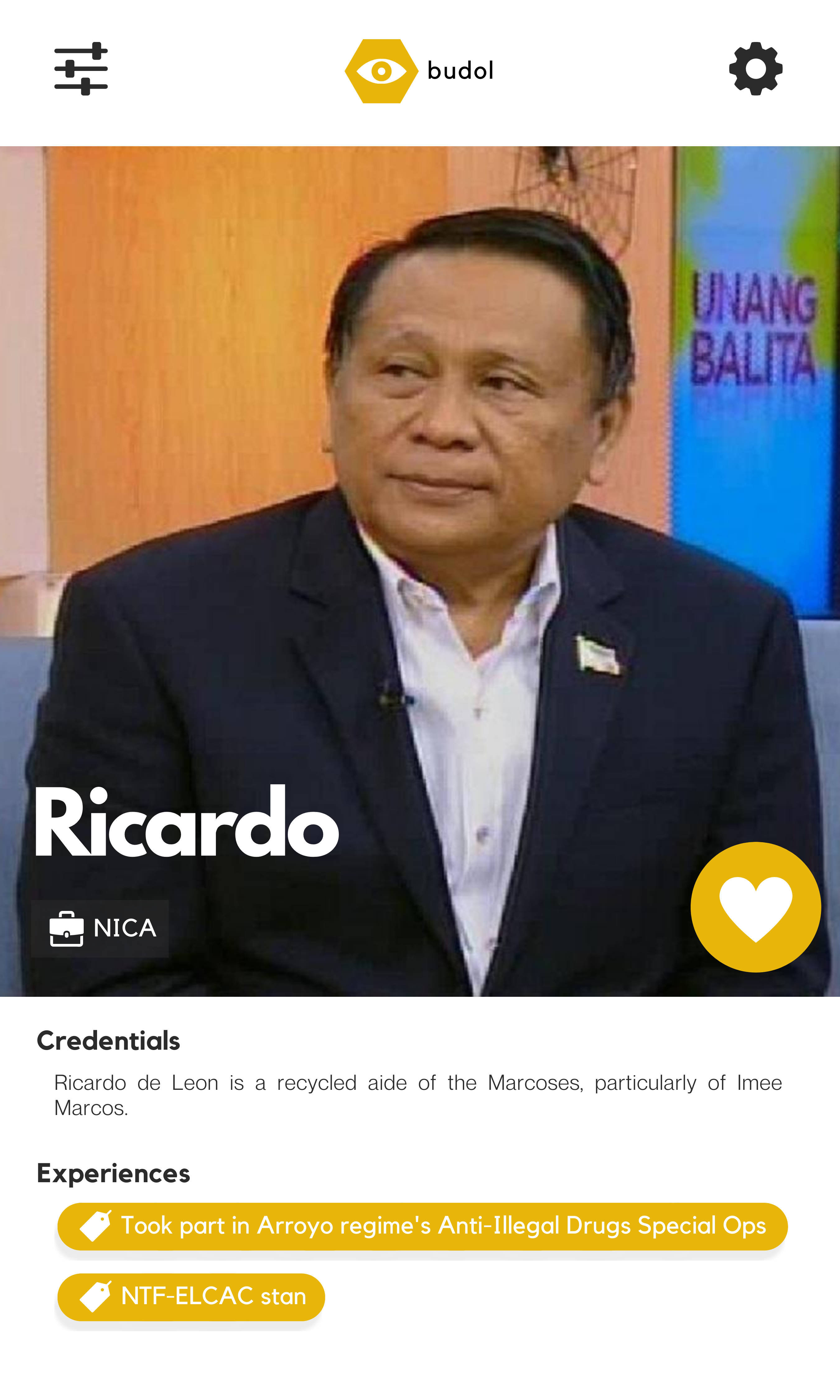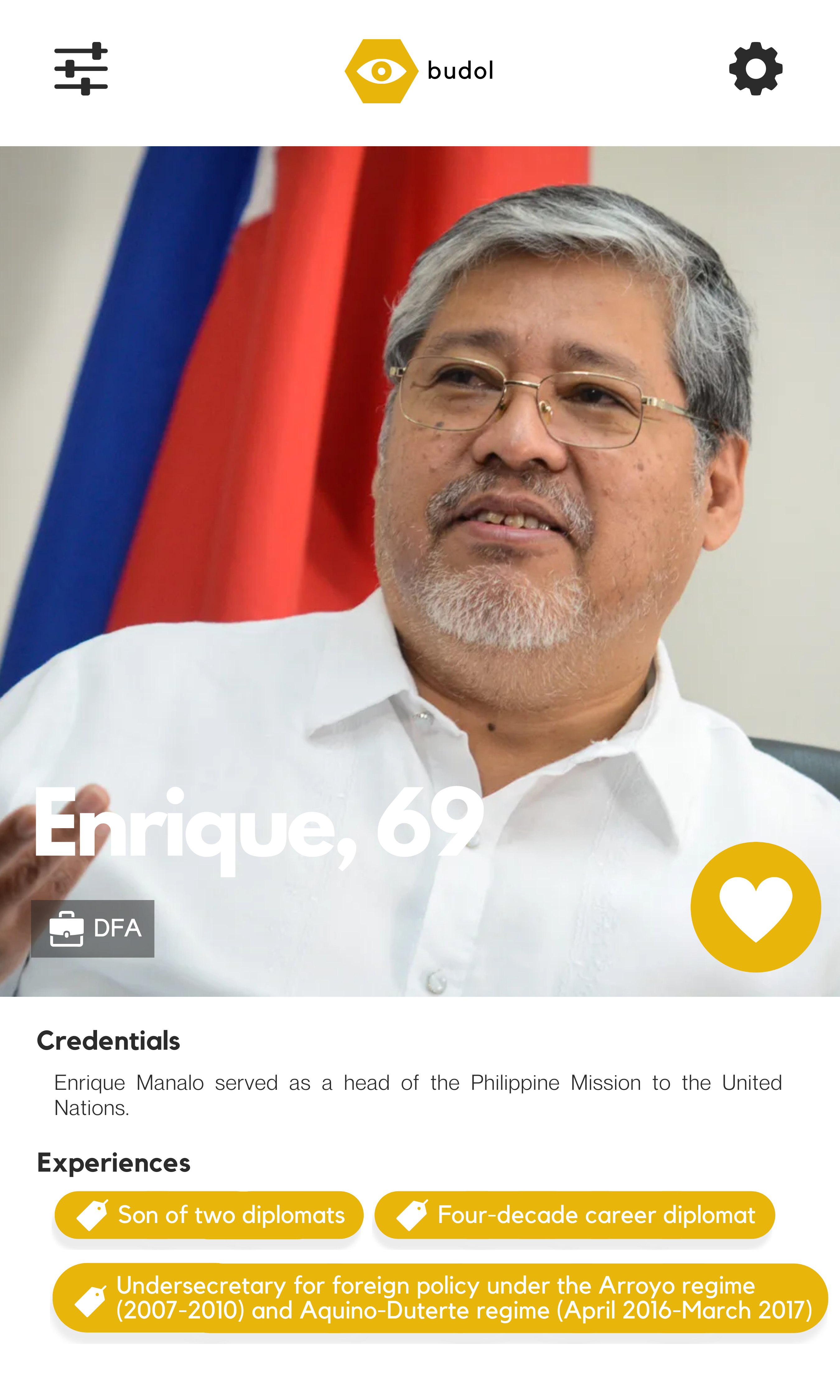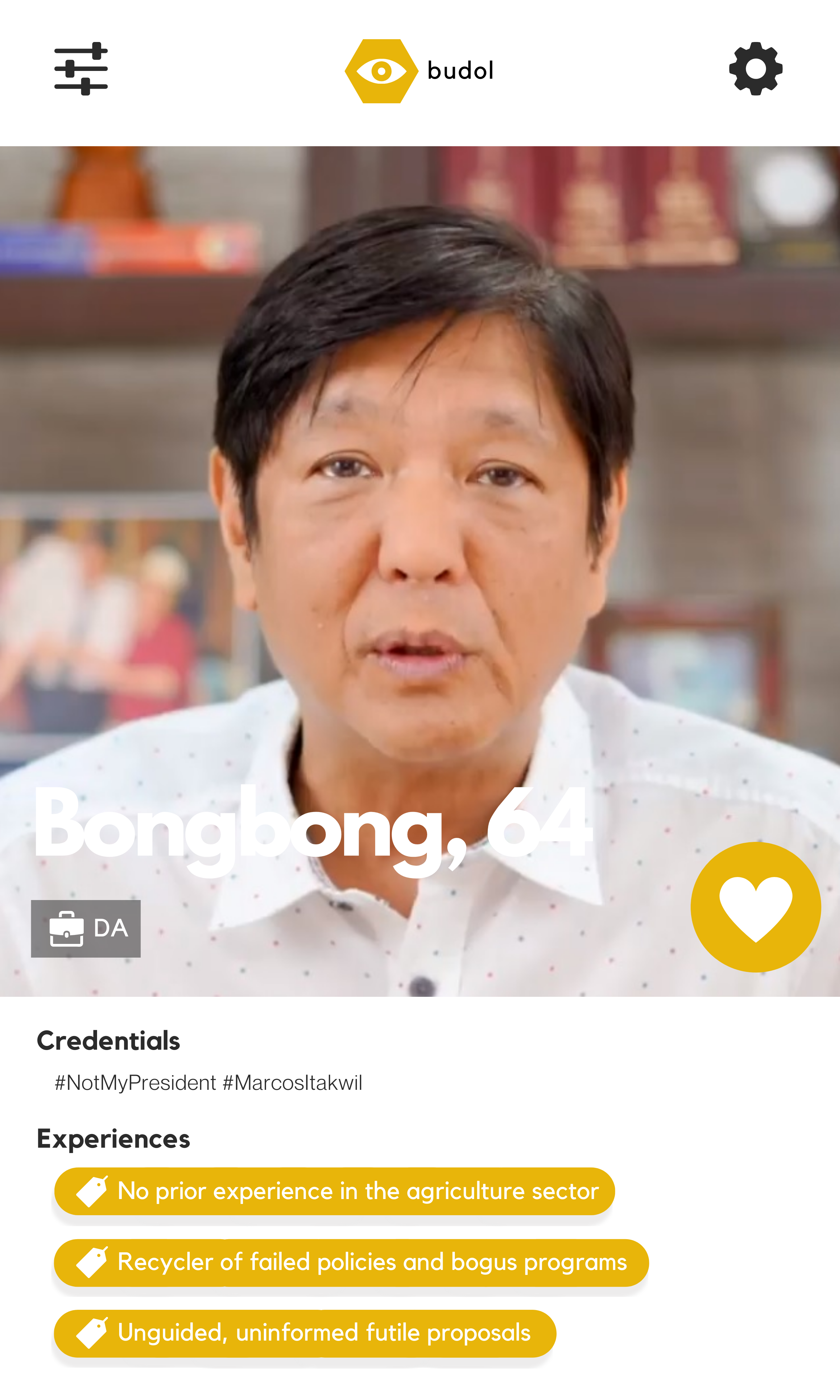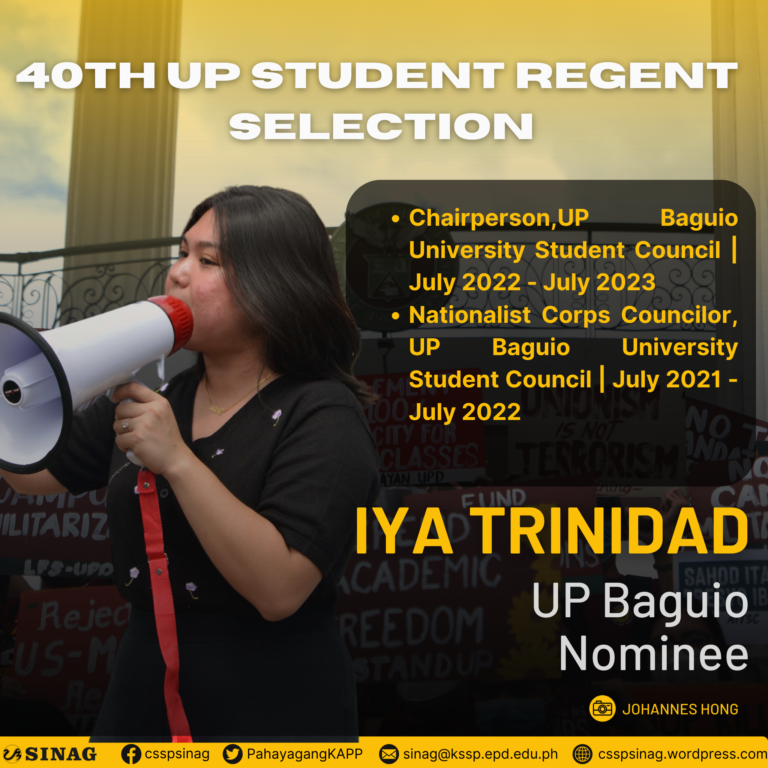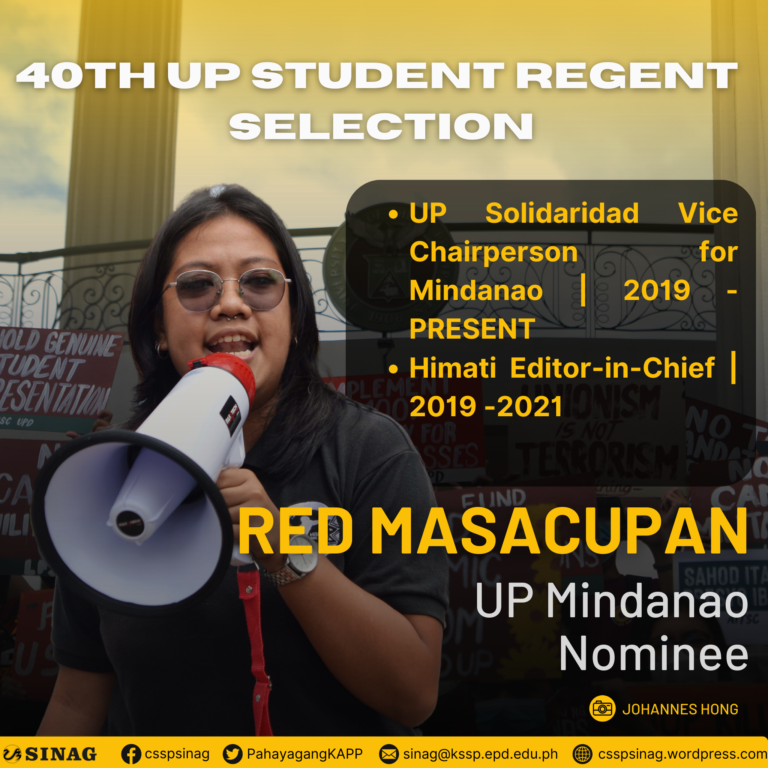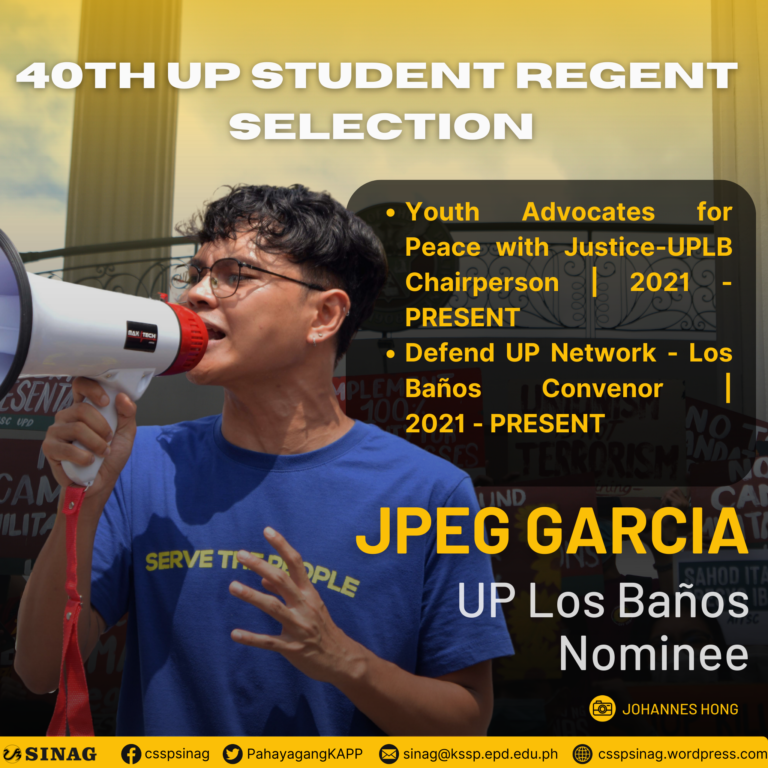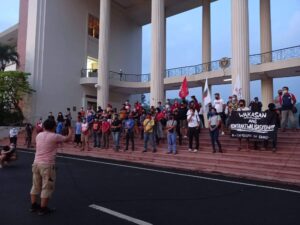Marcos, Jr. is family-friendly, and embodies the value of “utang na loob,” as he recycles key figures from his dictator father’s term up to his campaign team. Yet, despite having taken oath last June 30, his Cabinet’s most essential posts, the DOH, DOST, and DENR, remain vacant; while his family returns to a grandeur way of living in the Malacañang, once again leeching off of the people’s wealth.
In Budol: Unsubtle Crony Traits’ fourth installment, we take a look into Marcos loyalists and devotees as they are given essential positions by Marcos, Jr. in his incomplete cabinet.
Solicitor General
Following his stint as the Duterte administration’s Justice secretary, Menardo ‘Boy’ Guevarra is going at it for another round as Marcos, Jr.’s Solicitor General, previously manned by now-appointed COA chief Jose Calida who was also flagged by COA in 2018 for anomalous transactions and unaccounted spendings.
Related: https://bit.ly/3P34CCl
As Justice secretary appointed in 2018, Guevarra alleged the DOJ had done its job under the Duterte regime for its initiative in the drug war review, in coordination with the Philippine National Police (PNP). He supposed it was handled successfully, despite non-action towards extrajudicial and politically-motivated killings, and lack of accountability on police officers who undertook the operations. Even the Commission on Human Rights (CHR) was excluded from the said review, and it was also criticized as insufficient, not fully taking into account the real figures of those killed under Duterte’s war on drugs.
The review remains unreleased to the public, clamored to be publicized for the sake of transparency. Despite a CHR’s record of more than 6,000 EJKs, this is a far cry from the human rights groups’ estimate amounting to around 30,000 killings.
Contrary to Guevarra’s successful narrative, the records of sustained undermining and disrespect of people’s rights and liberties must be raised, alongside the clear rottenness of the justice system, only truly serving the interests of those aligned with the state’s interests.
This is manifest in the unjust detention of activists and human rights advocates, such as the illegal arrest of Tinang 93, murder of New Bataan 5, the killings and arrests during Bloody Sunday, and thousands more cases of injustices inckusive of red-tagging.
Now, as SolGen, a position Marcos, Jr. was not entirely aware of, Guevarra will handle the Philippine Commission on Good Governance (PCGG) tasked to recover the Marcoses’ ill-gotten wealth. According to Guevarra, he “intends to stick to the role of the OSG as the defender of the Republic and tribune of the people.”
Yet, with close ties with the Marcoses, the PCGG is foreseen to allegedly “expand” its mandate. This means that the commission’s primary focus would transcend that of the Marcoses’ plundered wealth. Guevarra affirmed this, stating that such a move won’t undermine operations to recover the people’s stolen money. But, critics assert otherwise as this may be a diversion tactic of the Marcoses.
As SolGen, Guevarra promises blurry hopes of holding the Marcoses accountable for their sins against the people. Despite intentions of “sticking true to his role,” there are manifest doubts in his actual intention to do so, recognizing his close relations with Marcos, Jr., and lack of regard for transparency and accountability for crimes committed by the Duterte regime.
Chief Presidential Legal Counsel
In yet another stint with the Marcoses, Juan Ponce Enrile is making his comeback this time as the late dictator’s son’s Chief Presidential Legal Counsel.
Enrile, having outlived more than five administrations following Martial Law, is a staunch Marcos loyalist who briefly turned his back on the family after switching sides with the Liberal Party in the wake of the 1986 EDSA People Power. Prior to his unabashed move, Enrile orchestrated what Marcos, Sr. would later proclaim as Martial Law in September 1972.
Marcos, Sr.’s former Justice secretary and Defense minister Enrile alleges previous attacks, such as the bombing in Plaza Miranda during the LP’s miting de avance and his supposed ambush, was all works of the communist movement which was one of the disinformation peddled by the Marcos, Sr. regime, justifying their resort to Martial Rule.
Yet, despite being ML’s mastermind, Enrile seemed to have been subject to amnesia, claiming no deaths, illegal arrests, and human rights violations took place.
Following his brazen climb to heroship after EDSA, the 98-year old Enrile once again joins forces with the criminal Marcoses. In a brief interview with Marcos, Jr., Enrile stated that only one individual was executed during Martial Law. To him, it was a Chinese drug lord named Lim Seng. He also added that the staggering 70,000 illegal arrests was “not true.”
Adding to the clear distortions the Marcoses have been cooking up for the past three decades, Enrile’s lies are countered by the large numbers of HRVs committed under Marcos, Sr.’s dictatorship, amounting to 3,240 killings, 34,000 tortures, and (a completely verified fact) 70,000 arrests.
Among the lies Enrile peddled was that the Jabidah Massacre is a mere “invention,” that derailed the already-tarnished Marcoses who caused their own downfall after having stolen billions worth of the people’s wealth, and murdering their regime’s dissenters.
Enrile is a Marcos devotee, serving the convicted family for decades and garnering a massive amount of wealth during Marcos, Sr.’s term. Enrile is never a “hero,” for “switching sides.” He is one of the people’s biggest enemies, alongside the Marcoses and the Dutertes, with his greedy expansion of political influence and divisive tactics. He is a traitor.
Now making his unwanted comeback as Marcos, Jr.’s CPLC, Enrile will once again ensure weaponization of the law in enforcing a culture of impunity, violence, and injustice against the people. Enrile will once again become the Marcoses’ reliable wingman.
Presidential Management Staff
Zenaida Angping was the former Manila Representative for three terms from 2007 to 2016, serving the 14th, 15th, and 16th Congresses. She also worked for the Office of the Governor of Leyte. Incoming press secretary Trixie Angeles said, “She advocated legislative measures that promoted diplomatic relations, tourism, development, public health and education, women and children’s welfare.”
The PMS is a Malacañang agency that aids the President in making decisions about policies and courses of action by providing frequent briefings or performing staff work on any issue the Chief Executive wishes to investigate. Moreover, the Office of the Special Assistant to the President supervises its operations.
Angping is a key figure in Marcos’ campaign team, especially handling finances. Marcos, Jr.’s campaign is alleged to have cost around P620M, yet non-inclusive of how much was allocated for social media ads and experts, also including trolls.
The PMS appointee is also a known close associate of Imelda Marcos’ brother, Kokoy Romualdez, who is father to appointed House of Representative president Martin Romualdez.
Angping, as a close friend of the Romualdez clan and one of Marcos, Jr.’s reliable campaign team heads, will faithfully play her role as head of the PMS, overlooking policies and measures that would be in favor of the newly-seated administration.
National Intelligence Coordinating Agency (NICA)
Ricardo de Leon is a recycled aide of the Marcoses, particularly of Imee Marcos. And, he is returning this time as the Marcos-Duterte regime’s chief in matters related to national intelligence.
To head the NICA, De Leon will become a rabid weapon of the Marcos regime in the designation of anti-Marcos individuals, despite lack of clear evidence. This is justified under the vague and unconstitutional Anti-Terror Law, fast-tracked during the past Duterte regime.
The Marcos loyalist is not new to such as he also previously took part in the Arroyo administration’s Anti-Illegal Drugs Special Operations, one of the regime’s scheme that catalyzed thousands worth of human rights violations and extrajudicial killings.
Now sitting as NICA’s chief, De Leon is sure to intensify Marcos, Jr.’s regime’s crackdown on democratic forces. Despite the Anti-Terror Ccouncil’s track record in redbaiting individuals, De Leon denies the state forces have never engaged in such.
Yet, this can be countered on several occasions, especially with National Security Adviser (NSA) Hermogenes Esperon’s recent move to block the websites of organizations he alleged as involved with the Communist Party of the Philippines (CPP). Likewise, De Leon affirms the establishment of the National Task Force to End Local Communist Armed Conflict (NTF-ELCAC), asserting the necessity to sustain the futile agency.
Despite the state’s generous funds allocation to the NTF-ELCAC, the agency has accomplished only 1% of its supposed projects. Majority of its budget is criticized to have been allocated in sponsoring the state’s all-out attack against the people.
What De Leon would promise as the next NICA chief is strengthened anti-people operations, designating anyone and everyone who goes against the Marcoses as “terrorists,” and ensuring their liberties and rights are compromised — all for the benefit of the criminal family.
Department of Foreign Affairs (DFA)
Hailing from a family of diplomats, Enrique Manalo is now the Secretary of Foreign Affairs, following two stints as a foreign affairs policy undersecretary.
He started his career as a diplomat in 1979 during Marcos, Sr.’s dictatorship. Now in his fourth decade, he will serve under the dictator’s son’s administration. Prior to his appointment, he served as chief of the Philippine Mission to the United Nations and the European Union.
Manalo previously served as undersecretary for policy under the Arroyo regime for three years from 2007-2010, for which he was also appointed under the Aquino and Duterte regime from April 2016 to March 2017.
Regarding his view on human rights abuses in the Philippines, he regarded the country’s performance in addressing such as “committed.” He noted in an interview last 2017, “the Philippines has done quite a lot to advance the cause of human rights.”
Fast forward to 2022, the Philippines remain a dangerous place for people who advocate for human rights as figures on HRVs are alarmingly large, whether those undocumented or reported. Take the Duterte regime as an example, which has been subject to International Criminal Court’s attention due to its deadly war on drugs and Duterte’s Death Squad during his mayoral stint in Davao.
At large, killings under the Duterte regime scaled up to an estimate of 30,000; whereas illegal political detainment have climbed up to more than 500 cases. This comes alongside policies which directly hampers human rights, including laws directly violative of people’s right to freedom of expression and to assembly. Such are manifest in the Anti-Terror Law, the violent dispersal of sectoral groups’ protests, and labor unions being dismantled.
To kick start his term as SFA, Manalo has previously met with China’s Foreign Minister Wang Yi in a courtesy visit to the country which Manalo invited Wang to. Both diplomats discussed PH-China’s bilateral relations, with hopes of both “ties deepening” especially on relevant concerns involving the bogus Belt and Road Initiative, a scheme employed by China criticized to be a mere “debt trap.” Through the BRI, countries are allowed large sums of loans for funding infrastructure projects.
Under said initiative, China has already funded several projects of the Duterte regime, including the Kaliwa and Chico River Dam. Despite expressing high hopes in “maintaining and building on the positive trend of relations between the Philippines and China,” links between both countries have been nothing but invasive and parasitic.
With Manalo as the new SFA, his stance on independent foreign policy* remains rather passive and vague, citing that partnerships be ensured to be for the interest of the Philippines. Yet, this clearly goes against what continues to transpire even 5 years after he made this claim with onerous and severely toxic relations of the country with foreign countries such as the US and China.
Despite his credentials as a career diplomat, his loyalty will be tested by the waters of upholding our sovereignty and human rights commitment against a Marcosian tyranny.
*Based on a 2017 interview following his appointment as foreign secretary under the Duterte regime
Department of Agriculture (DA)
Never hungry nor tilled, Ferdinand ‘Bongbong’ Marcos, Jr. is ambitious to think that he is qualified enough to solve decades-long agricultural problems. His platforms are as empty as his futile 20-peso rice promise. Yet, he dared to appoint himself as the Agriculture secretary.
Prior to his electorally fraudulent triumph as president in the 2022 National Elections, Marcos, Jr. had promised he would attempt to bring down the prices of rice to P20-P30, and would also resort to the procurement of rice products from local farmers at “high, competitive prices.” He promised he would subsidize the prices of rice products.
However, several lawmakers and critics have questioned his proposals, asserting its infeasibility. According to Kilusang Magbubukid ng Pilipinas (KMP), Marcos, Jr.’s proposal is similar to his dictator father’s program during Martial Law. They likewise refuted his intentions to subsidize the production of rice as it poses yet another failure, similar to Marcos, Sr.’s subsidy program which only incurred a surge in rice prices during the 1980s.
Contending the Duterte administration’s neoliberal Rice Liberalization Law (RLL), Marcos, Jr. stated he would amend the law to make it more “local farmer-friendly,” halting rice imports while also honoring current agreements that the previous administration entered into.
The irony of it all, however, lies in the RLL’s destructive impact on the livelihood of local farmers precisely due to the onerous trade agreements the Duterte administration had with foreign rice producers. No matter how good Marcos, Jr. may make it seem to be, the genuine solution to the crisis experienced by local farmers is the junking of the RLL, and focusing on innovating local farmers’ production and heeding their clamors for genuine agrarian reform.
However, this was never the priority of the Marcoses, especially as upholding the farmers’ interests would directly contradict their own. Marcos, Sr. can be a testament to that, with his bogus Green Revolution and Masagana 99 program which falsely offered farmers loan programs that, in the long run, resulted in rural banks’ bankruptcy due to the program’s irresponsible and unsustainable management.
Related: https://bit.ly/3nJ8rku
This was offered as a proposal by Marcos, Jr., citing its alleged success. Now, two similar proposals by former DA secretary William Dar are praised by Marcos — the Masagana 150 and Masagana 200, which would focus on increasing the target yield of inbred and hybrid rice production. He asserted the proposals be immediately “operationalized,” stating they are both “good models.”
Likewise, despite supposed aversion to reliance on imports, Marcos, Jr. noted that to solve the scarcity in meat products, the country would have to continually depend on pork and chicken imports.
Moving forward, the fisheries’ sector is one but many of which Marcos, Jr. falsifies his knowledge on, particularly after peaking headlines with his made-up claims of galunggong being the easiest to raise. This is despite the fact that it is still in its early experimental stage, as per the DA’s pronouncements.
Marcos, Jr. can never solve the crisis in local agricultural production with him being completely ignorant of the problems faced by the farmers and fisherfolks today, and the obvious lack of concrete plans for the sector. He can never resolve such long-standing problems through recycling his dictator father’s measures which have been proven to be short-lived, if not a complete failure.
Holding the post “for now,” Marcos, Jr. stated he would still have to study the situation on-ground; however, his self-appointment and a lackluster platform for the agriculture sector proves either his unpreparedness or excessive “hunger for power,” as asserted by KMP.
As Agriculture secretary, he must address the local farmers and fisherfolks’ demands, which all boils down to pro-Filipino policies such as the implementation of the Genuine Agrarian Reform Bill and the suspension of excise tax on oil products — both of which Marcos, Jr. will never even attempt to uphold as this will derail the interests of his oligarch and landlord allies.
There are indeed no promises and no hopes for the agriculture sector, especially manned by the son of a dictator who bankrupted, sabotaged, and ignored the sectors’ woes and demands amid an all-time poverty crisis. Recycling proven failures and devising futile measures, Marcos, Jr. as Agri chief only promises scams of policies, inevitably worsened hunger, and a reality the farthest cry from self-sufficiency.
PART 3: https://bit.ly/3alES5r






